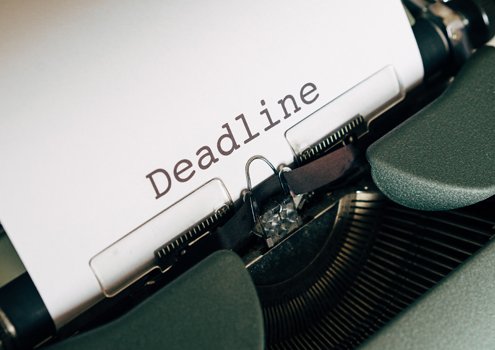Reading time: About 2 minutes
Few of us finish projects completely voluntarily — we do it because deadlines drive productivity….
By Ann Gomez
I’ve always wanted to wake up earlier. The idea of having fresh morning hours to focus on my goals before the busyness of life sweeps in has always appealed to me. I’d go so far as to say I’m a tad envious of early birds.
I’ve even tried to trick myself into waking up earlier than I need to. But this doesn’t seem to work consistently for me. Try as I might, I’m wired to be a night owl, not a lark. When the alarm clock rings, my mind stubbornly declares, ‘I’m not falling for this. You and I both know this isn’t the real wake up time.’ And then I effortlessly drift back into la-la land.
Deadlines are a bit like alarm clocks. When we must wake up, alarm clocks work very well (even for heavy sleepers like me). Similarly, fixed deadlines are highly effective at prompting action. Few strategies can compete with a non-negotiable deadline when it comes to prompting action. It’s amazing how much we can accomplish when we owe a report to our key client by noon. Deadlines drive productivity.
But when the deadline (or alarm) is self-imposed, we often press snooze. Likewise, if you rely on l yourself to provide this accountability, you’re more likely to put off a task. During busy days with multiple other competing demands, it’s easy to push off work that doesn’t have to be done now.
And so, with the same level of adoration I have for my cozy bed, I am enthusiastically pro-deadline. When a task is important to you, I suggest you commit to a deadline. And by commit, I mean tell someone else when you’ll complete the task; someone you wouldn’t want to let down. Telling your mom you’ll submit an article for publication probably isn’t enough of a fixed deadline. Moms tend to be too forgiving. ‘That’s ok sweetie – have a cookie.’
At the same time, be careful not to over-commit yourself. I would recommend you use deadlines to drive your productivity for any tasks that relate to one of your core priorities. (Plus, you can often renegotiate a deadline if it all becomes too much.)
How can we make deadlines less scary?
If deadlines feel onerous and a bit scary to you, try breaking your bigger projects into tiny steps first. Interim deadlines related to small steps feel less intimidating and are more attainable in the midst of hectic days.
Small steps help us create critical, early momentum. This is why project management is grounded in breaking big tasks down into smaller, attainable steps. Once we start and realize some early success, it’s easier to continue. Incidentally, focusing on small steps is also a great way to stop procrastinating.
With that, my deadline to complete this blog is here, so I’ll officially wrap up. I hope this read has given you a renewed appreciation for how deadlines drive productivity around what we value most.


